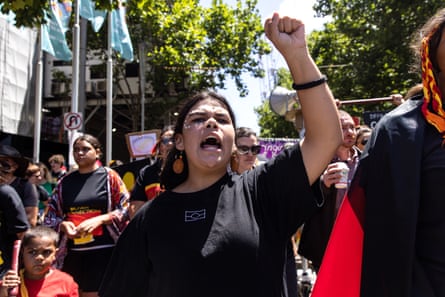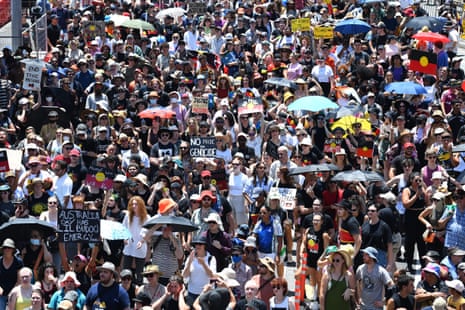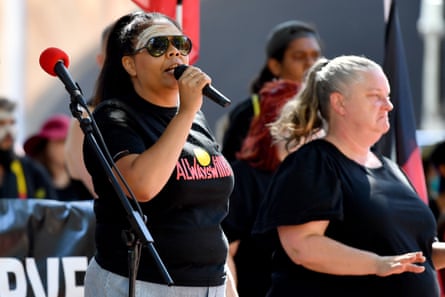Tens of thousands of people have marked Australia’s national day by attending protest rallies in cities across the nation, amid a rising political and social reckoning with the country’s colonial history.
Australia Day – 26 January – commemorates the landing of the British First Fleet of convicts at Sydney Cove in 1788, the beginning of the settlement that entrenched European colonisation of the Australian continent.
“We need to stop the lying,” Prof Marcia Langton, a Yiman and Bidjara woman, said on Thursday, arguing that Australia’s national day should not be one that commemorates colonisation. “The biggest lie, of course, is Australia Day. I think we can find an inclusive date and I think we can start to tell the truth about Australia’s history and show some respect for all the survivors of the frontier wars.”

While the date has been acknowledged since the 19th century, Australia Day has been a national public holiday only since 1994, and has grown increasingly divisive with a broadening public consciousness of the systematic dispossession of Indigenous Australians, the genocidal violence that marked British settlement and the persistent disadvantage and oppression faced by Indigenous people.
On Thursday, rallies were held to mark “Invasion Day”, “Survival Day” and “Sovereignty Day”, in a public sign that activities on 26 January are moving from the fireworks, festivals and flag-waving of the past to become marked by more sombre reflection, protest and, for many, disengagement.

Increasing numbers of Australians are choosing to campaign to “change the date”. Councils have forsworn to hold citizenship ceremonies on the day, and the national broadcaster’s annual music poll – previously a 26 January fixture – has been moved to the nearest weekend.
In Sydney, Wiradjuri woman Lynda-June Coe told the thousands-strong crowd the day marked a “reckoning” for white Australia.
“235 years and we ain’t going nowhere,” she said.
“They tried to wipe us out, still here. They tried to breed us out, still here. They tried to commit genocide on us, still here.”

The prime minister, Anthony Albanese, said on Thursday there was no proposal from his government to move Australia Day to another date, but a Guardian Essential poll found growing support for a change: 26% of Australians were supportive in 2023, up from 20% a year ago, and 15% in 2019. Advocates argue an eventual change of date is inevitable.
Defenders of Australia Day, such as the conservative opposition leader, Peter Dutton, argue Australia should celebrate its unique blend of Indigenous, British and multicultural histories.
“We shouldn’t be embarrassed or ashamed by who we are, we should be more proud of who we are,” Dutton said. “We don’t need to tear down one part of our history to build up the other.”

The moment of reflection on Australia’s history and national identity has been particularly acute this year as the country begins to debate a referendum proposed for later in the year that would enshrine an Indigenous “voice” to parliament in the constitution.
The voice would advise the parliament and government on matters relating to the social, spiritual and economic wellbeing of Aboriginal and Torres Strait Islander people.
Parliament and government would be obliged to consult the voice on matters that overwhelmingly relate to Indigenous people, but the voice – proposed to be made up of 24 Indigenous people drawn from across the country – would not be a law-making body.
Rather, it would be a platform for Indigenous people to directly advise all levels of government about laws and policies that affect their lives, the minister for Indigenous Australians, Linda Burney, a Wiradjuri woman, has argued.
“It’s about drawing a line on the poor outcomes from the long legacy of failed programs and broken policies, and listening to Aboriginal and Torres Strait Islander people.”

Holding a referendum on the voice was an election commitment of the Labor government, which took power last year, but it has faced opposition from outside and within Indigenous Australia.
The Greens senator and First Nations spokeswoman Lidia Thorpe, a DjabWurrung Gunnai Gunditjmara woman, told an Invasion Day rally in Melbourne the Australian government needed to sign a treaty recognising Indigenous sovereignty before any vote on the voice.
“Do we want to become advisers now? We deserve better than that. We deserve better … our constitution comes from the soil and the blood of our people. We need peace. We deserve better than an advisory body.
“We want real power, and we won’t settle for anything less.”

 1 year ago
71
1 year ago
71










 English (US)
English (US)